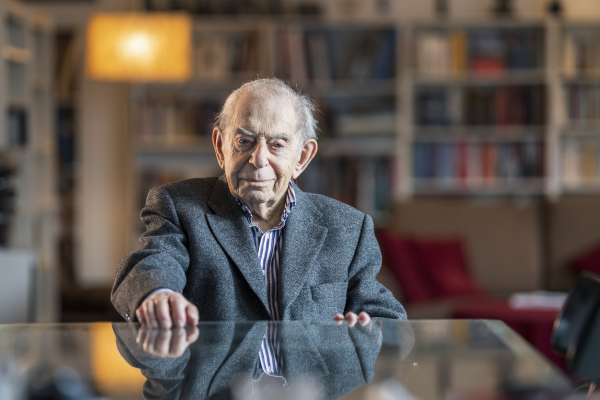Contemporary witness Paul Lendvai
Paul Lendvai was born in Budapest on 24 August 1929. As the son of Jewish parents, he survived persecution by the National Socialists in Hungary and the death march to Austria in 1944 at the age of 15 with the help of a Swiss Schutzpass [safety pass]. The traumatic experiences of his youth and the political change he experienced had a lasting impact on him.
After the Second World War, he began his journalistic career at social democratic newspapers in Hungary. In 1953, he was arrested and imprisoned for eight months, and was banned from working as a journalist for three years.
After the Hungarian Uprising, he fled Hungary in 1957 and travelled to Vienna via Prague and Warsaw. He wrote first for the Austrian daily Die Presse and then for other newspapers in Switzerland and Germany, in some cases using pseudonyms to protect his mother, who was still living in Hungary. In 1959, Paul Lendvai became an Austrian citizen. From 1960 to 1982, he worked as a foreign correspondent for the London newspaper the Financial Times and gained an increasing reputation as an expert on Eastern and Southern Europe.

© NEWS VGN Matt Observe
"While the subject matter is unbelievably tragic, it is fascinating to read why Lendvai had repressed the name Gunskirchen for decades and how he then came to research what happened there and uncover his own memories. After reading the book, you have a better understanding of the internal forces driving Lendvai, the journalist and political commentator, to inform his audience." – Frankfurter Allgemeine Zeitung, 2008 about Best of Paul Lendvai – Begegnungen, Erinnerungen, Einsichten (Best of Paul Lendvai – Encounters, Memories, Insights).
In this book, published in 2008, Paul Lendvai remembers the day he found about the existence of Gunskirchen concentration camp. It was only through the random kindness of a caretaker in Budapest that the fifteen-year-old Lendvai narrowly escaped being among the Hungarian Jews whose death march ended at this satellite camp of Mauthausen concentration camp.
In 1973, Paul Lendvai founded the magazine Europäische Rundschau as the voice of East-West relations and remained its editor-in-chief until it ceased publication in 2020. From 1982 onwards, Paul Lendvai was the editor-in-chief at the Eastern Europe department of the ORF public broadcasting company. His journalistic work coincided with a period in which the Cold War dominated the perspective of Eastern Europe. He later became director-general of Radio Österreich International, where he played a key role in its reporting. From 1980 to 2024, Paul Lendvai shaped the Austrian discourse on Europe as the host of the programme Europastudio. His commitment to objective and critical reporting can also be seen in his reactions to the Waldheim affair.
"Paul Lendvai’s work is characterised by critical distance, a deep scepticism of nationalism and populism, coupled with profound historical knowledge. His writing, precisely worded analyses and political commentary are evidence of a spirit that is inspired by Humanism and is always questioning himself and the world." – praise for Paul Lendvai’s work from Der Standard in 2008.
A staunch democrat and an analytical expert, Paul Lendvai has dealt critically with Europe’s past and present in numerous publications. His book "Mein verspieltes Land. Ungarn im Umbruch" (My Squandered Country. Hungary Transformed) is one of the first to critically examine the political developments in Hungary under Viktor Orbán and it discusses the dangers of autocratic governments.
His comprehensive critique of Orbán’s aspirations to power led to threats and harassment against the author, but also to a broad public discourse on Hungary’s political development. As a commentator at the daily Der Standard, Paul Lendvai is an influential voice in Austrian journalism.
His twenty-one books, many of which have been published in foreign languages, focus on political developments in Austria, Hungary and Eastern Europe. He recently published the study ‘Über die Heuchelei’ [About the Hypocrisy]. Paul Lendvai has been honoured with many awards, including the Austrian State Prize for Cultural Journalism and the Concordia Prize for Lifetime Achievement, and he has taken a consistently critical attitude towards authoritarian regimes.
Today, Paul Lendvai lives with his wife Zsóka in their homes in Vienna and Altaussee.
"Lendvai’s writing is living, vital contemporary history: always discriminating and unforgiving towards itself, but for that reason always worth reading." Der Falter (weekly Austrian news magazine), 2008






